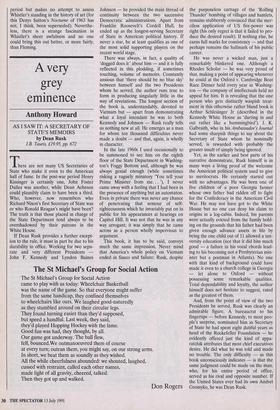A very grey eminence
Anthony Howard.
AS I SAW IT: A SECRETARY OF STATE'S MEMOIRS
by Dean Rusk I.B. Tauris, £19.95, pp. 672 There are not many US Secretaries of State who make it even to the American hall of fame. In the post-war period Henry Kissinger is certainly one, John Foster Dulles was another, while Dean Acheson could plausibly claim to have been a third. Who, however, now remembers who Richard Nixon's first Secretary of State was or who Ronald Reagan's might have been? The truth is that those placed in charge of the State Department tend always to be overshadowed by their patrons in the White House.
If Dean Rusk provides a further except- ion to the rule, it must in part be due to his durability in office. Working for two sepa- rate and very different Presidents John F. Kennedy and Lyndon Baines Johnson — he provided the main thread of continuity between the two successive Democratic administrations. Apart from Franklin Roosevelt's Cordell Hull, he ended up as the longest-serving Secretary of State in American political history. If never a star, he at least qualifies as one of the most solid supporting players on the recent world stage.
There was always, in fact, a quality of `dogged does it' about him — and it is fully reflected in this plodding, if sometimes touching, volume of memoirs. Constantly anxious that 'there should be no blue sky' between himself and the two Presidents whom he served, the author runs true to form in producing singularly little in the way of revelations. The longest section of the book is, understandably, devoted to Vietnam but — apart from demonstrating what a loyal intendant he was to both Kennedy and Johnson — Rusk really tells us nothing new at all. He emerges as a man for whom ten thousand difficulties never made a doubt — and that, again, is wholly in character.
In the late 1960s I used occasionally to be summoned to see him on the eighth floor of the State Department in Washing- ton's Foggy Bottom and, although he was always genial enough (while sometimes risking a vaguely minatory 'You tell your Prime Minister from me. . . '), I never came away with a feeling that I had been in the presence of anything but an automaton. Even in private there was never any chance of penetrating that armour of self- righteousness which he invariably put on in public for his appearances at hearings on Capitol Hill. It was not that he was in any way arrogant; it was simply that he came across as a person wholly impervious to argument.
This book, it has to be said, conveys much the same impression. Never mind that America's whole policy on Vietnam ended in fiasco and failure: Rusk, despite the purposeless carnage of the 'Rolling Thunder' bombing of villages and hamlets, remains stubbornly convinced that the mer- ciless application of US fire-power was right (his only regret is that it failed to pro- duce the desired result). If nothing else, he earns full marks for consistency — and that perhaps remains the hallmark of his public career.
He was never a wicked man, just a remarkably blinkered one. Although a Rhodes Scholar — he was very proud of that, making a point of appearing whenever he could at the Oxford v. Cambridge Boat Race Dinner held every year in Washing- ton — the company of intellectuals held no appeal for him. It is revealing that the one person who gets distinctly waspish treat- ment in this otherwise rather bland book is Arthur Schlesinger Jr (described in the Kennedy White House as 'darting in and out rather like a hummingbird'). J. K. Galbraith, who in his Ambassador's Journal had some sharpish things to say about the Secretary of State whom he nominally 'served, is rewarded with probably the greater insult of simply being ignored.
Yet, as the earlier and best parts of his narrative demonstrate, Rusk himself is in many ways a living proof of the welcome the American political system used to give to meritocrats. He certainly started out with no advantages. He was born one of five children of a poor Georgia farmer whose own father had ridden off to fight for the Confederacy in the American Civil War. He may not have got to the White House but no one can deny his claim to origins in a log-cabin. Indeed, his parents were actually evicted from the family hold- ing on the grounds that his father had been given enough advance assets in life by being the one child out of 11 allowed a uni- versity education (not that it did him much good — a failure in his vocal chords lead- ing to his becoming not a Presbyterian min- ister but a postman in Atlanta). No one with that kind of background could have made it even to a church college in Georgia — let alone to Oxford — without possessing some remarkable qualities. Total dependability and loyalty, the author himself does not hesitate to suggest, rated as the greatest of them.
And, from the point of view of the two Presidents he served, Rusk was clearly an admirable figure. A bureaucrat to his fingertips — before Kennedy, to most peo- ple's surprise, nominated him as Secretary of State he had spent eight dutiful years as head of the Rockefeller Foundation — he evidently offered just the kind of appa- ratchik attributes that most chief executives desire. He did what he was told and made no trouble. The only difficulty — as this book unconsciously indicates — is that the same judgment could be made on the man, who, for his entire period of office, served as his rival and opposite number. If the United States ever had its own Andrei Gromyko, he was Dean Rusk.


















































 Previous page
Previous page